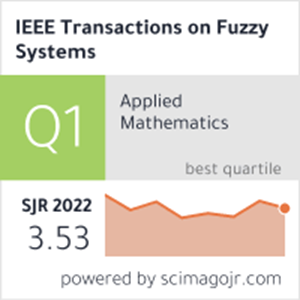Predictor-Based Fuzzy Optimal Tracking Control With Enhanced Transient Estimation and Learning Performance for Nonlinear Systems
IF 10.7
1区 计算机科学
Q1 COMPUTER SCIENCE, ARTIFICIAL INTELLIGENCE
引用次数: 0
Abstract
In this article, a finite-time learning-based optimal tracking problem for nonlinear systems with preassigned performance constraint is investigated. By designing a state predictor, a fuzzy approximator driven by prediction errors rather than tracking errors is formulated to precisely compensate the effect of the unknown uncertainties. The design realizes a decoupling of control and estimation loops, effectively ensuring transient approximation performance and avoiding chattering induced by nonzero initial tracking errors. Then, based on the estimated components, a robust steady-state control scheme embedded with a prescribed performance mechanism is tailored to guarantee that the output state can converge to a predefined range within a preassigned time. This endows the designed controller with a specified time tracking capability independence on control parameters. To make a tradeoff between tracking precision and energy cost, a finite-time learning-based optimal control policy is exploited by utilizing adaptive dynamic programming technique to serve as an adaptive supplementary controller, where single critic neural network is trained for acquiring the solution of the Hamilton–Jacobi–Bellman equation. Compared with the traditional gradient descent method, the established learning law is updated by introducing an auxiliary variable, which enhances learning performance and guarantees finite-time convergence of adaptive weights. Simulation examples examine the effectiveness and superiority of the suggested scheme.基于预测器的非线性系统模糊最优跟踪控制及其增强的暂态估计和学习性能
本文章由计算机程序翻译,如有差异,请以英文原文为准。
求助全文
约1分钟内获得全文
求助全文
来源期刊

IEEE Transactions on Fuzzy Systems
工程技术-工程:电子与电气
CiteScore
20.50
自引率
13.40%
发文量
517
审稿时长
3.0 months
期刊介绍:
The IEEE Transactions on Fuzzy Systems is a scholarly journal that focuses on the theory, design, and application of fuzzy systems. It aims to publish high-quality technical papers that contribute significant technical knowledge and exploratory developments in the field of fuzzy systems. The journal particularly emphasizes engineering systems and scientific applications. In addition to research articles, the Transactions also includes a letters section featuring current information, comments, and rebuttals related to published papers.
 求助内容:
求助内容: 应助结果提醒方式:
应助结果提醒方式:


